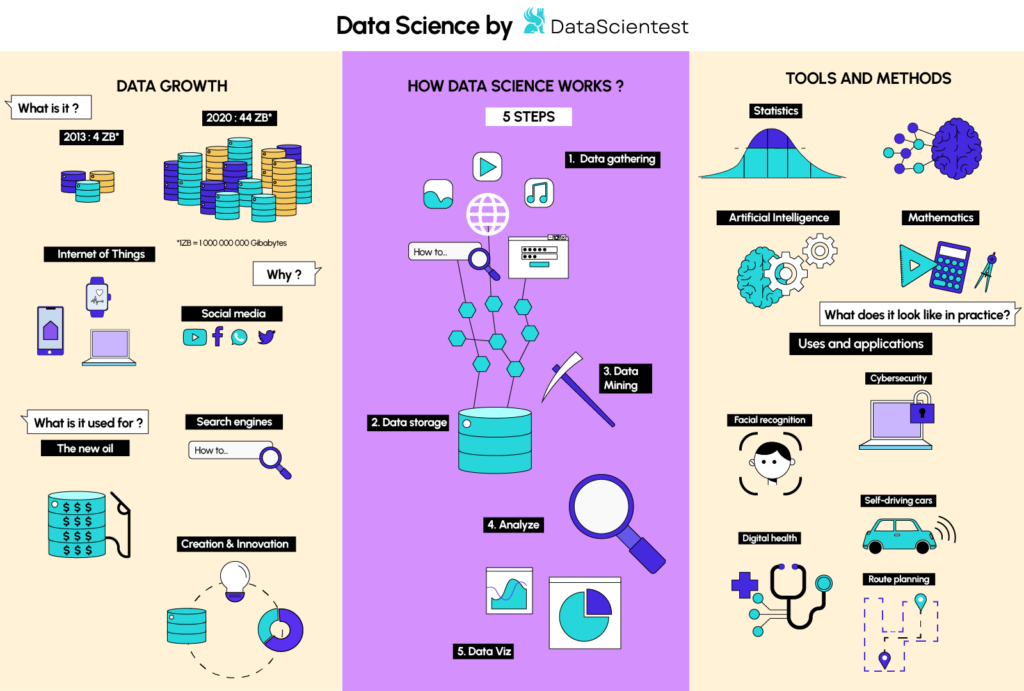Data Science is a broad, multidisciplinary field that aims to make sense of raw data. Data Science: definition, fields of application and current limits, discover everything you need to know about this complex field, which has become a priority issue for companies in all industries.
What is Data Science ?
The simplest way to define Data Science is the extraction of actionable information from raw data. This multidisciplinary field has the primary goal of identifying trends, patterns, connections and correlations in large data sets.
Data science includes a wide variety of tools and techniques such as computer programming, predictive analysis, mathematics, statistics or artificial intelligence. Data Science now also includes Machine Learning algorithms.
Today, almost all companies claim to practice Data Science in some form or another. However, the methods and approaches used may vary from one organization to another.
Therefore, it becomes very complicated to offer a precise definition of Data Science. Especially since new technologies are constantly appearing and continually transforming this field. So, to define Data Science, the best question to ask yourself is “why ?”.
"Why" Data Science ?
Data Science is booming in all sectors of activity because humanity is generating more and more data. Between 2011 and 2013, in just two years, the global volume of data has increased nine-fold.
And this explosion of Big Data has not slowed down since then. By the end of 2020, the total volume of data worldwide is expected to reach 44 zettabytes compared to less than 5 zettabytes in 2013.
How can this phenomenon be explained ? Several emerging technologies are generating data. This is the case of connected objects, social networks, smartphones, or web search engines.
But all this data offers unprecedented opportunities for companies in all industries, research institutions or the public sector. That’s why data is often referred to as “the oil of the 21st century“.
The goal of Data Science is to exploit these data, to give them meaning. This discipline aims to explore large “lakes of data” in search of connections, trends, points of interest.
By building on these discoveries, it is possible to create innovative new products and services, solve real-world problems, and improve performance like never before. Data Science enables you to make decisions based on data, rather than on mere intuition. As a result, it is revolutionizing our daily lives and opening up new horizons. In short, Data Science will be a key science in the world tomorrow !
How does Data Science work ?
Data Science covers a wide variety of disciplines and areas of expertise. Its goal, however, remains to give meaning to raw Data.
To achieve this, Data Scientists need skills in data engineering, mathematics, statistics, computer science, and data visualization. These skills will enable them to scan large raw data sets to extract the most relevant information and communicate it to decision makers in their organizations.
Data Scientists also exploit artificial intelligence, particularly Machine Learning and Deep Learning. These technologies are used to create models and make predictions using algorithms and various techniques.
Data science can be broken down into five stages. Each of these steps requires different techniques, tools and skills.
- Data must be collected and extracted from various sources.
- This Data must be stored in a Data warehouse, cleaned and transformed so that it can be analyzed.
- At this stage, Data must be processed using data mining, clustering, classification or modeling.
- The data is then analyzed using techniques such as predictive analysis, regression or text mining.
Finally, the last step consists of communicating the information obtained through reporting, dashboarding or data visualization.
How is used Data Science ?
There are many varied cases of use of Data Science. This technology is used to assist decision-making in companies, but also allows the automation of certain tasks.
It is used to detect anomalies or fraud. Data Science also allows classification, for example to automatically sort emails in your inbox. It also allows prediction, for example for sales or revenues. By using it, it is possible to detect trends or patterns in data sets.
Data Science also hides behind facial, speech or text recognition technologies. It also powers recommendation engines that can suggest products or content based on your preferences.
From one sector of activity to another, Data Science is exploited in different ways. In the healthcare sector, data today enables a better understanding of diseases, the use of preventive medicine, the invention of new treatments, or the acceleration of diagnoses.
In logistics, Data Science helps optimize routes and internal operations in real time, taking into account factors such as weather and traffic. In finance, it allows to automate the processing of credit agreement data thanks to Natural Language Processing or to detect fraud thanks to Machine Learning.
Retail companies use it for advertising targeting and personalized marketing. Recommendation engines, based on the analysis of consumer preferences, are used by Google for its web search engine, by streaming platforms like Netflix or Spotify, and by e-commerce companies like Amazon.
Cybersecurity companies are turning to Artificial Intelligence (AI) and Data Science to discover new malware on a daily basis. Even autonomous cars rely on Data Science and predictive analysis to adjust their speed, avoid obstacles and dangerous lane changes, or choose the fastest route.
Find out about our training courses in the different professions of Data Science such as Data Scientist, Data Analyst, Data Engineer.










